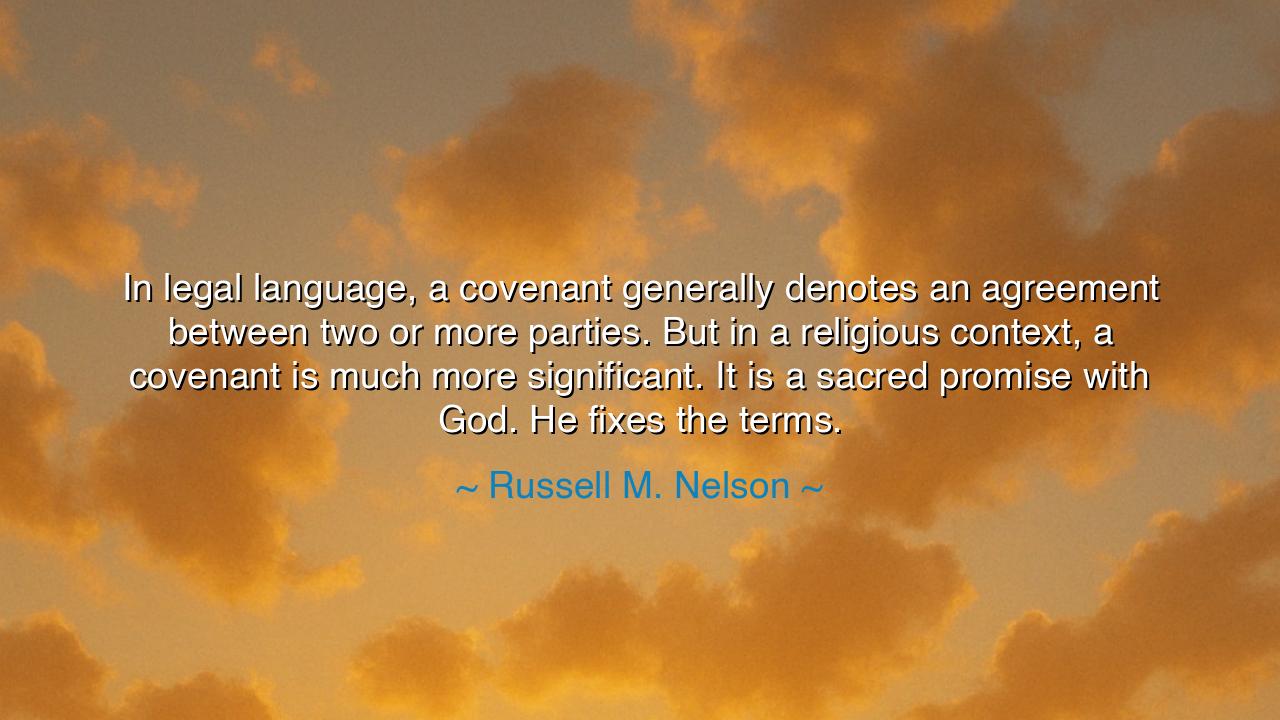
In legal language, a covenant generally denotes an agreement
In legal language, a covenant generally denotes an agreement between two or more parties. But in a religious context, a covenant is much more significant. It is a sacred promise with God. He fixes the terms.






Hear, O children of faith and seekers of wisdom, the solemn words of Russell M. Nelson: “In legal language, a covenant generally denotes an agreement between two or more parties. But in a religious context, a covenant is much more significant. It is a sacred promise with God. He fixes the terms.” In these words lies the dividing line between earthly contracts and heavenly bonds, between the bargains of men and the solemn promises of eternity. For in the realm of law, men bargain with one another, shaping terms to fit their will. But in the realm of spirit, it is God Himself who declares the terms, and man who must humbly choose whether to walk in obedience.
The ancients knew this truth well. In the courts of men, an agreement could be broken, renegotiated, or forgotten, for it was the creation of human will. But a covenant with God is different: it is eternal, binding not only in this life but in the world beyond. To enter into such a covenant is to step into a sacred relationship, where the soul pledges faithfulness not to a man, nor to an institution, but to the Almighty who is both witness and judge. Thus Nelson teaches that the covenant is not merely mutual convenience, but divine commandment joined with divine mercy.
Consider the ancient story of Abraham, who was called by God to leave his homeland and walk into the unknown. God promised him descendants as numerous as the stars and a land for his inheritance. But this was no ordinary bargain; it was a covenant. The terms were fixed not by Abraham, but by God: Abraham must walk before Him and be blameless. In this story we see the very heart of Nelson’s words: a covenant is not the work of equal partners but the act of submission to divine authority, met by divine blessing.
Likewise, the people of Israel at Mount Sinai entered into covenant when they received the law through Moses. The thunder, the fire, and the tablets of stone bore witness that this was no earthly treaty. The covenant bound them as a people chosen, consecrated, and accountable. When they kept it, they flourished; when they broke it, they fell into exile. The covenant was not negotiable, for God fixed the terms. Yet it was always laced with mercy, for He also promised restoration to those who returned with contrite hearts.
The meaning of Nelson’s teaching is thus both profound and humbling: to call something a covenant in the religious sense is to recognize that man is not master of the terms. In the legal realm, pride may bargain; in the spiritual realm, humility must submit. And yet, this submission is not bondage but liberation, for in yielding to the will of God, the soul is freed from the chaos of its own desires. To live in covenant is to live in order, peace, and eternal purpose.
The lesson for future generations is this: do not treat your promises with God as lightly as you treat your contracts with men. Earthly agreements may bind your possessions, but divine covenants bind your soul. Guard them, keep them, and remember them always. When you stumble, repent swiftly, for though the covenant is fixed, God is merciful to those who honor it with sincerity.
Practical action lies before you: when you enter into any sacred promise—whether in baptism, in marriage, or in discipleship—remember that it is not a negotiation but a submission to holy law. Live so that your deeds align with your words, and let your daily actions bear witness to your covenant. Teach your children the weight of promises, so that they grow in reverence rather than casualness. And above all, remember that to walk in covenant is to walk not alone, but with God as companion.
So let it be remembered: a covenant is more than contract. It is the eternal bridge between man and God, where God fixes the terms and man, in humility, accepts or rejects. Blessed are those who accept, for they walk beneath the shelter of divine promise. Cursed are those who scorn, for they wander without anchor. Choose the path of covenant, and you choose life everlasting.






AAdministratorAdministrator
Welcome, honored guests. Please leave a comment, we will respond soon